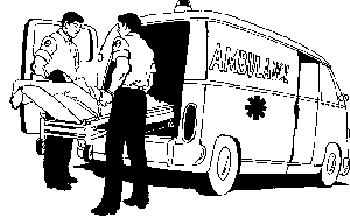By Jessica Santibanez

By Jessica Santibanez
EMERGENCY MEDICAL SERVICES. FUNDING. TELEPHONE SURCHARGE. INITIATIVE CONSTITU- TIONAL AMENDMENT AND STATUTE.
According to the American Heart Association, approximately seven to eight million people each year will seek treatment in an emergency department in the United States for chest discomfort. Of those patients seeking treatment, approximately two million will actually suffer from a cardiac-related condition. About 1.5 million will suffer from an actual heart attack. Of those patients, 500,000 will die from a heart attack, 250,000 of whom will die within one hour following the onset of the signs and symptoms. And these are only the heart attack victims.
Each year, millions of people will die from a medical illness and half will die because they did not seek medical treatment immediately. However, most people suffering from illness will not seek medical treatment simply because they do not have insurance or don’t want to wait forever in the emergency room.
Under state and federal law, any person seeking emergency medical care must be treated regardless of his or her ability to pay. As a result, hospitals, physicians and first responders (firefighters and paramedics), are not compensated for the treatment and transportation they provide.Hospitals and emergency caregivers were usually compensated through other means, including Proposition 99 (the tobacco tax and health protection act) and the 911 account. However, the amount received by Proposition 99 and the 911 account can no longer cover the enormous cost of uncompensated health care. As a result, government reports show that there are 64 fewer hospital emergency rooms and trauma centers available for patients in California than there were 10 years ago.Emergency rooms are overcrowded with long wait times. First responders are overwhelmed and lack the resources needed to provide the quality lifesaving care that every patient deserves. And with more emergency rooms closing down every year, the time it takes for an ambulance to get to the hospital could double or triple, and in an emergency every second counts.
So in order to save what is left of emergency medical services, Proposition 67 would establish a 3 percent raise to the existing surcharge rate on telephone use within California when calling 911. The surcharge paid by residential customers would be limited to 50 cents per month for each telephone bill received. The surcharge will not be imposed on low-income residents eligible for lifeline telephone services, for cellular telephone services or for commercial telephone lines.
Revenues from the 3 percent surcharge increase (equaling around $500 million) would be distributed to the 911 account, emergency and trauma first responders account, community clinics urgent care account, the emergency and trauma physician uninsured account and the emergency and trauma hospital services account.
Every account listed will use the revenues to make technological and service improvements to the 911 system, provide training and equipment to firefighters, paramedics and other first responders, provide urgent care to the uninsured and reimburse hospitals and physicians who provide uncompensated emergency services to patients.
It’s understandable that no one wants to pay more money out of their paycheck every month for what most people believe should be free, but these are the people who come to our rescue when we are sick, injured or dying. They help us when we can no longer help ourselves and they’re always just a phone call away.
Vote yes on Proposition 67 and continue to support the emergency medical services so that they can continue to help us.






